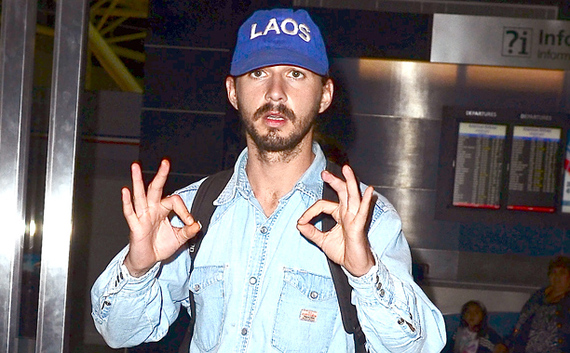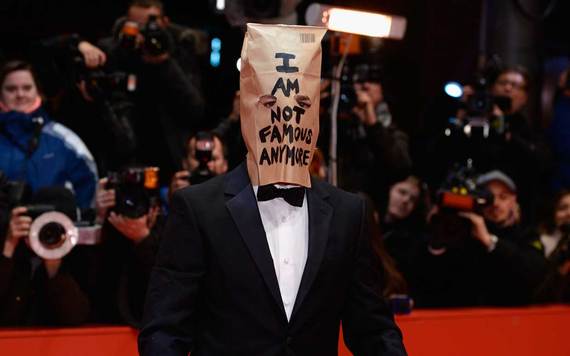Several days ago, I received permission from colleague and poet Jesse Damiani to republish his extraordinary poem "Knock Knock" on Ink Node, a publishing platform for literary artists. I asked to republish the poem because I was struck by both its textual simplicity and conceptual complexity. "Knock Knock" is simultaneously an expression, enactment, refutation, and encouragement of American cynicism that only takes a moment to experience but deserves significant reflection upon reading.
The poem can be found here, and by all rights ought to be looked at before you read on any further.
Damiani's poem is a working exemplar of "metamodernism," the new cultural paradigm famously embraced by embattled actor Shia LaBeouf in a recent interview with the aptly titled magazine Interview. As recapped by Entertainment Weekly, in his lengthy chat with Interview interviewer Elvis Mitchell LaBeouf said that his controversial behavior over the last eighteen months -- which included brown-bagging his own head at a movie premiere, leaving a press conference in midstream, and getting arrested at a Broadway musical -- was all part of a performance informed by metamodernism. "Metamodernism has influenced a lot of my actions in the public in this last year and a half," LaBeouf told Mitchell. LaBeouf went on to describe metamodernism as "sincerity with a wink...it's all things...modernist commitment and postmodern detachment. It's a feeling that comes after deconstruction..." Inspired by the essays of Dutch cultural theorists Timotheus Vermeulen and Robin van den Akker, LaBeouf's metamodernism is a rebuke of postmodern cynicism that seems particularly apt just a few days after jaded American voters in the 18-to-29 demographic stopped voting altogether (as fully one-third of the demographic that voted in such numbers for President Obama declined to vote in the midterm election this last Tuesday).
Which brings us to Damiani, who uses the virtual white space afforded by online publishing venues to both perform "sincerity with a wink" and also to encourage readers to experience that sensation for themselves. The poem is structured as a classic "knock knock" joke, with the archetypal opening line ("knock knock") serving as the poem's title, and the response to that knocking -- the single word "love" -- constituting the entire body of the piece. But Damiani's gambit is much more sophisticated than the treacly sentiment it initially seems to be, as not only is the poem a meta-commentary on the role of literature in contemporary culture, it also is a choose-your-own-adventure reading experience that won't be the same for everyone -- and couldn't possibly be.
Readers clicking on the link above find immediately a title ("Knock Knock") followed by, well, nothing -- just empty white space. The absence of a poem body suggests to the reader that he's been duped, and that "Knock Knock" is merely another postmodern quip on the order of Samuel Beckett's "Waiting for Godot," in which great anticipation is frustrated by the inevitability of absence and senselessness. In other words, the cynical, postmodern response to the beginning of a "knock knock" joke is silence -- as once the joke has been started, nothing more need be said. In poststructuralism, the only real value to the phrase "knock knock" is that we can immediately recognize the parcel of cultural capital it signifies, a tired but communal formal structure into which a great many jokes can be put. Many readers, knowingly or unknowingly steeped in the poststructuralists' cultural sphere, will see the empty space beneath Damiani's title and click away to something else equally disappointing on the internet. Such readers are expecting to be duped by art and artists, and for them "Knock Knock" does nothing to disappoint in this regard. For them the lowered expectations of the Internet Age have been duly met by a poem that purports to share a common culture with them but ultimately can't deliver on its promise of empathetic collegiality.
Some readers of "Knock Knock" won't be so easily dissuaded, however. They'll either assume there's more to the poem -- perhaps out of a benighted optimism -- or reflexively blame themselves for the error (attributing the absence of any poem-text to their shoddy computer, a connectivity problem, or some sort of human error). These readers have a choice: give up on the poem or go searching for its content.
The most adventuresome, optimistic, or simply foolhardy readers of "Knock Knock" will scroll down on Ink Node to find the single word "love," and having found it will see, too, that their expectation of artistic cynicism has been frustrated by a message so achingly sincere it rightly faces the charge of being saccharine. The poem itself -- simply the word "love" -- stands in here for all literature's response to its increasingly hard-to-credit promise of actual value. If we find love in books, it's the love of life, of language, of meaning, of the exertions and exchanges of other humans. Literature may not be the only place we find these things, but prior to the advent of the Internet it was perhaps the only place we could encounter them while alone. And unlike social media, literature gives us no false sense of community to fall back on when considering the Big Questions.
Having literally found love in a poem whose point of entrance appeared to be merely coy, the reader of "Knock Knock" is faced with an additional decision: do I read on? Do I search for more than love? Does "love" satisfy or frustrate? To cease reading "Knock Knock" upon discovering its core (and ultimately only) message is to reject the clear statement of a simple emotion as necessarily disingenuous; to scroll on past "love" in "Knock Knock" with the hope of finding more content is the same act of continued courage we all exhibit merely by waking up in the morning. Damiani's poem urges us to push on past cynicism to find value in that which at first seems empty, and to then push on past even that discovery to the unknown places where additional meaning might yet be found.
"Knock Knock" is a deeply cynical poem to the extent it plays on readers' cynicism and tests their emotional resolve, and a deeply earnest poem inasmuch as it rejects Godot's premise of eternal absence in favor of a single, all-encompassing, ever-present force -- for while "love" may hold no weight when it's a word tossed around blindly, when it's the only content of a published poem and can only be found through an elective act it feels like something with heft. It's in this interplay between sincerity and irony, optimism and cynicism, the artifice of Art and the real-time epiphanies of Life that we locate the metamodern quality of "Knock Knock." Just as LaBeouf, exerting his metamodern inclinations through performance art, created the Los Angeles-based "#IAMSORRY" exhibit -- in which participants confronted a silent LaBeouf across a small table and were forced to decide what to do next -- Damiani's poem is putting both cynicism and its opposite number on the table and letting us do with each as we will.
Having read all of the foregoing, you might wonder whether offering such an extensive analysis of such a slight poem -- as has been done here -- isn't itself a sort of metamodern experiment. Is "Knock Knock" actually doing the work it says here Damiani and his poem are doing? We can't know. But we can decide to click on an article (this one) that explicitly promises that "everything can change," and we can search for love in a poem that seems at first to offer us nothing, and we can read a discussion of that poem to invoke in ourselves an interest in accessible but conceptually complex literature that perhaps has long laid dormant.











